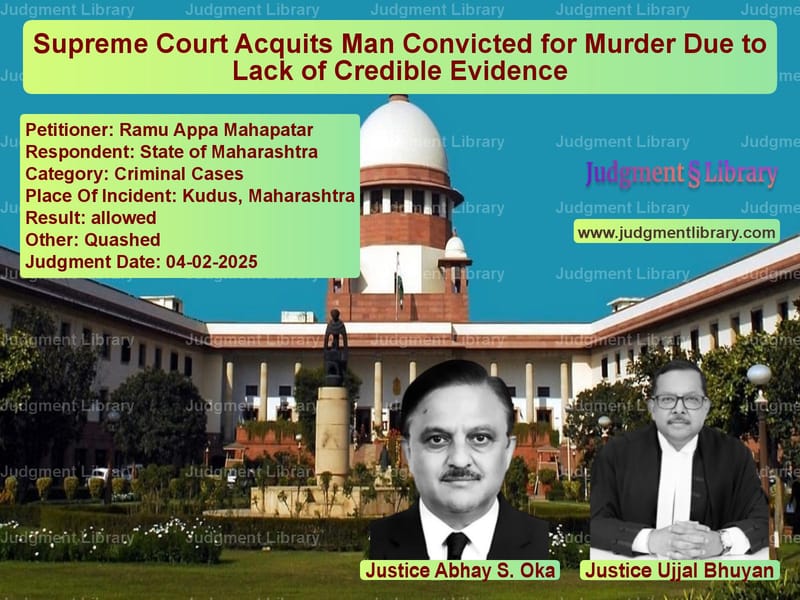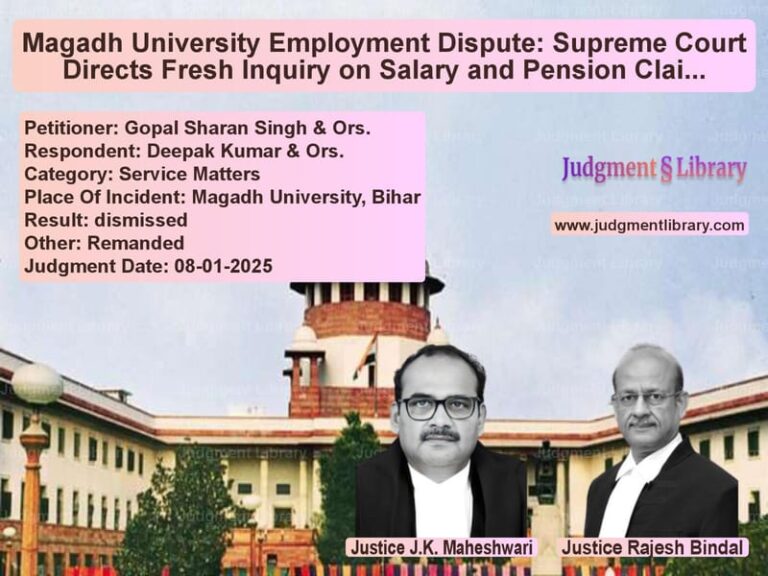Supreme Court Acquits Man Convicted for Murder Due to Lack of Credible Evidence
In a crucial judgment, the Supreme Court of India acquitted Ramu Appa Mahapatar, who had been convicted of murder under Section 302 of the Indian Penal Code (IPC). The Court overturned the decisions of both the Sessions Court and the Bombay High Court, citing lack of credible evidence, unreliable extra-judicial confessions, and inconsistencies in witness testimonies.
Background of the Case
The case dates back to an incident in 2003, when the appellant, Ramu Appa Mahapatar, was accused of murdering his live-in partner, Manda. The prosecution alleged that the accused had an altercation with Manda, leading him to fatally assault her with a grinding stone and a stick. The body was discovered in their rented chawl in Kudus village, Maharashtra.
The appellant was convicted by the Sessions Court in 2004 and sentenced to life imprisonment. The Bombay High Court upheld this conviction in 2010. Dissatisfied with the verdict, the appellant approached the Supreme Court.
Key Legal Issues
- Whether the prosecution proved the case beyond a reasonable doubt based on circumstantial evidence.
- Whether the alleged extra-judicial confession was credible and voluntary.
- Whether witness testimonies were consistent and reliable.
- Whether the benefit of the doubt should be granted to the accused.
Arguments by the Appellant
The appellant’s counsel contended:
- The conviction was based on weak circumstantial evidence.
- The alleged extra-judicial confession made to the witnesses was unreliable and not corroborated by independent evidence.
- The prosecution failed to present forensic evidence linking the accused to the crime.
- The witnesses’ testimonies were contradictory and failed to establish the appellant’s guilt beyond a reasonable doubt.
“The prosecution has failed to establish a continuous chain of events linking the accused to the crime beyond reasonable doubt.”
Arguments by the Respondents
The prosecution and the State of Maharashtra argued:
- The appellant was the last person seen with the deceased before her death.
- The extra-judicial confessions made to multiple witnesses were credible and sufficient for conviction.
- The state of the crime scene, including broken bangles and strewn household items, indicated a struggle.
- The accused’s conduct after the incident, including his attempt to inform the victim’s family, showed his involvement.
“The accused himself admitted to assaulting the victim in his extra-judicial confessions. This is a clear indicator of guilt.”
Supreme Court’s Observations
The Supreme Court meticulously examined the case and highlighted multiple inconsistencies:
- The prosecution failed to provide forensic evidence such as bloodstains on the accused’s clothes or a match between the alleged murder weapon and the wounds.
- The extra-judicial confessions were made under dubious circumstances, as the accused was reportedly in a confused state of mind.
- Witness testimonies were inconsistent—PW-3, the victim’s brother, initially stated that the accused confessed to him, but his police statement lacked this assertion.
- The accused’s conduct, including informing the victim’s relatives, was inconsistent with that of a murderer trying to evade capture.
“A conviction cannot be based on extra-judicial confessions alone unless they inspire full confidence and are corroborated by independent evidence.”
Final Judgment
The Supreme Court ruled:
“The conviction under Section 302 IPC is set aside. The accused is acquitted of all charges and shall be released from custody forthwith unless required in any other case.”
The Court emphasized the importance of corroborating circumstantial evidence and ensuring that extra-judicial confessions meet a high standard of reliability before they can be used as the sole basis for conviction.
Impact of the Judgment
This ruling reinforces key legal principles:
- Extra-judicial confessions must be voluntary, credible, and corroborated by independent evidence.
- Circumstantial evidence must establish a continuous and unbroken chain leading to the guilt of the accused.
- Suspicion, however strong, cannot replace legal proof beyond reasonable doubt.
- Witness statements must be consistent and free from major contradictions to be relied upon.
By acquitting Ramu Appa Mahapatar, the Supreme Court has upheld the principle that no individual should be convicted based on unreliable evidence, ensuring that justice prevails based on well-established legal principles.
Petitioner Name: Ramu Appa Mahapatar.Respondent Name: State of Maharashtra.Judgment By: Justice Abhay S. Oka, Justice Ujjal Bhuyan.Place Of Incident: Kudus, Maharashtra.Judgment Date: 04-02-2025.
Don’t miss out on the full details! Download the complete judgment in PDF format below and gain valuable insights instantly!
Download Judgment: ramu-appa-mahapatar-vs-state-of-maharashtra-supreme-court-of-india-judgment-dated-04-02-2025.pdf
Directly Download Judgment: Directly download this Judgment
See all petitions in Murder Cases
See all petitions in Bail and Anticipatory Bail
See all petitions in Judgment by Abhay S. Oka
See all petitions in Judgment by Ujjal Bhuyan
See all petitions in allowed
See all petitions in Quashed
See all petitions in supreme court of India judgments February 2025
See all petitions in 2025 judgments
See all posts in Criminal Cases Category
See all allowed petitions in Criminal Cases Category
See all Dismissed petitions in Criminal Cases Category
See all partially allowed petitions in Criminal Cases Category







